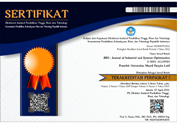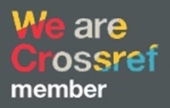MANAJEMEN PERAWATAN MESIN IQF MENGGUNAKAN METODE RELIABILITY CENTERED MAINTENANCE (RCM) STUDI KASUS DI PT ANEKA GAS INDUSTRI Tbk.
DOI:
https://doi.org/10.51804/jiso.v2i2.62-67Keywords:
failure mode and effect analysis, Mesin IQF, Individual Quick Frezing, Reliability centered maintenanceAbstract
Penelitian ini dilakukan pada salah satu industri di kota Sidoarjo yang bergerak dibidang produksi udang beku. Seiring meningkatnya kapasitas produksi, performasi mesin pun kian lama semakin menurun akibatnya sering terjadi breakdown maintenance yang menyebabkan proses produksi terhenti dan banyak menimbulkan kerugian. Salah satu faktor didalamnya adalah tidak adanya manajemen perawatan yang diterapkan. Untuk mendapatkan hasil yang sesuai maka digunakanlah salah satu metode penelitian pada bidang perawatan, yaitu Reliability Centered Maintenance (RCM). Dengan metode tersebut, didapatkan penentuan mesin kritis, komponen mesin kritis, Failure Mode Effect Analysis (FMEA), perhitungan biaya kerugian, besarnya biaya perawatan, hingga penentuan interval perawatan yang optimal. Sehingga dari manajemen perawatan tersebut perusahaan dapat menghemat biaya hingga lebih dari Rp.404.956.008.00; biaya tersebut jauh lebih efisien daripada biaya breakdown maintenance yang selama ini dijalankan.
References
Azis, M. T., Suprawhardana, M. S., & Purwanto, T. P. (2010). Penerapan Metode Reliability Centered Maintenance (RCM) Berbasis Web Pada Sistem Pendingin Primer Di Reaktor Serba Guna Ga. Siwabessy. In Jurnal Forum Nuklir (Vol. 4, pp. 81–98).
Dhamayanti, D. S., Alhilman, J., & Athari, N. (2016). Usulan Preventive Maintenance Pada Mesin KOMORI LS440 dengan Menggunakan Metode Reliability Centered Maintenance (RCM II) dan Risk Based Maintenance (RBM) di PT ABC. JRSI (Jurnal Rekayasa Sistem Dan Industri), 3(02), 31–37.
Prasetya, D., & Ardhyani, I. W. (2019). Perencanaan Pemeliharaan Mesin Produksi Dengan Menggunakan Metode Reliability Centered Maintenance (RCM)(Studi Kasus: PT. S). JISO: Journal of Industrial and Systems Optimization, 1(1), 7–14.
Downloads
Published
Issue
Section
License
With the receipt of the article by JISO Editorial Board and the decision to be published, the copyright regarding the article will be transferred to JISO. The copyright transfer form can be downloaded here.
JISO has the right to multiply and distribute the article and every author is not allowed to publish the same article that was published in this journal.
JISO is licensed under a Creative Commons Attribution-ShareAlike 4.0 International License.
Under the following terms:
Attribution — You must give appropriate credit, provide a link to the license, and indicate if changes were made. You may do so in any reasonable manner, but not in any way that suggests the licensor endorses you or your use.
ShareAlike — If you remix, transform, or build upon the material, you must distribute your contributions under the same license as the original.














